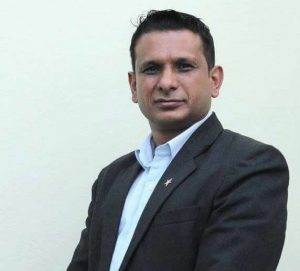Ramesh Sherpa: Changing the course of trading

Established Silk Group in 2018
Husband to Jangmu Sherpa
Father to Chhime Sherpa and Hissi Sherpa
 My father started a trading business 35 years ago. He imported everyday utility goods to luxury products from China and sold them in the Nepali market. Bringing in consignment from China was quite a challenge back then. The road condition was poor and the journey was full of risk. No one was willing to take this risk before my father.
It was not an easy line of business. Nepal-China trade at the time was a completely new concept. There were trades happening with Tibet, but it was mostly Nepal exporting goods. Tibet being a landlocked country was highly dependent on Nepal for products during those days. Tibet did not made any goods that Nepal could import, but China had a great potential, though there were several risks.
Bad road conditions did not just make travel dangerous, there was also the risk of goods, particularly electronic appliances, getting damaged en route.
Despite the risks, my father was determined to make this business a success.
Back then, Nepal used to import clothes, electronics and other items from places like Japan and Singapore during those days and naturally, they came with huge price tags for a common Nepali to be able to buy them. Only rich people could enjoy these items but for the low- and middle-income people, even the basic items seemed like a luxury.
Can you imagine, an average Nepali could not even buy a decent jacket to see them through the winter during those days? The Chinese products that my father imported were much cheaper. Everyone could afford them. So, in a way, my father’s business created a level playing field for consumers.
I formally joined the business 15 years ago but I grew up observing and learning about this trade since my childhood. My mother used to handle the business in Khasa and my father in Kathmandu. Although I was raised in Sindhupalchok, I used to stay with one of my parents during my one-month long Dashain holiday. So, besides spending most of my time in Sindhupalchok, I was also going back and forth between Khasa and Kathmandu. The way I spent my childhood has a lot to do with what I am today. I learned the ins and outs of my family business from my parents.
Of course, every business is driven by profit. But my father started this business not just with the sole objective of making profit. He also wanted to provide affordable and quality products to common Nepalis, not just the wealthy ones. We carry the same business values to this day.
[caption id="attachment_32117" align="alignnone" width="300"]
My father started a trading business 35 years ago. He imported everyday utility goods to luxury products from China and sold them in the Nepali market. Bringing in consignment from China was quite a challenge back then. The road condition was poor and the journey was full of risk. No one was willing to take this risk before my father.
It was not an easy line of business. Nepal-China trade at the time was a completely new concept. There were trades happening with Tibet, but it was mostly Nepal exporting goods. Tibet being a landlocked country was highly dependent on Nepal for products during those days. Tibet did not made any goods that Nepal could import, but China had a great potential, though there were several risks.
Bad road conditions did not just make travel dangerous, there was also the risk of goods, particularly electronic appliances, getting damaged en route.
Despite the risks, my father was determined to make this business a success.
Back then, Nepal used to import clothes, electronics and other items from places like Japan and Singapore during those days and naturally, they came with huge price tags for a common Nepali to be able to buy them. Only rich people could enjoy these items but for the low- and middle-income people, even the basic items seemed like a luxury.
Can you imagine, an average Nepali could not even buy a decent jacket to see them through the winter during those days? The Chinese products that my father imported were much cheaper. Everyone could afford them. So, in a way, my father’s business created a level playing field for consumers.
I formally joined the business 15 years ago but I grew up observing and learning about this trade since my childhood. My mother used to handle the business in Khasa and my father in Kathmandu. Although I was raised in Sindhupalchok, I used to stay with one of my parents during my one-month long Dashain holiday. So, besides spending most of my time in Sindhupalchok, I was also going back and forth between Khasa and Kathmandu. The way I spent my childhood has a lot to do with what I am today. I learned the ins and outs of my family business from my parents.
Of course, every business is driven by profit. But my father started this business not just with the sole objective of making profit. He also wanted to provide affordable and quality products to common Nepalis, not just the wealthy ones. We carry the same business values to this day.
[caption id="attachment_32117" align="alignnone" width="300"] Ramesh Sherpa (second from right) during the opening ceremony of Operation and Management of Tatopani Dry Port.[/caption]
While I was in high school, my classes used to be over by 10 in the morning, so I started to involve myself in the business during my free time. My parents did not have any educational background, and yet they had established a successful business. They believed that I could bring more to the table since I was educated.
My hometown is a place filled with businesspersons, and I always wanted to be one of them. However, I did not just want to become a businessman from Sindhupalchok. I wanted to be a businessman who is known across the country. I have to say I did reach to that level, but I still feel I have a lot of room for improvement.
During the first few years of formally joining my family business, I did things the traditional way. I followed the footsteps of my parents. But I always wanted to introduce some new ideas and changes. Among those changes, one of them was building a name. A brand for the business not just deals in trading of goods but also handles several logistical avenues. Silk Group Pvt Ltd was formed in 2018.
I believe that our local products need better branding and exposure so that we could export them. Our local businesses have a lot of potential. Before, we had to import everything from outside. But now, many of those imported goods can be replaced by our own products, from packaged goods to hygiene to hardwares.
Why can’t we be the once exporting goods to other countries when others can do the same. I see a lot of potential here.
Today, most aspects of how we conduct business have changed. If you look at the developing world, you see that most things are digital. Technology has transformed the business landscape and I believe Nepali businesses must adapt accordingly. We do not have a choice but to upgrade ourselves in order to keep up.
There are many policies introduced by the Nepal government that favor businesses to prosper. I believe that there is a lot of potential for Nepali businesses to flourish if they were to follow the right track.
Ramesh Sherpa (second from right) during the opening ceremony of Operation and Management of Tatopani Dry Port.[/caption]
While I was in high school, my classes used to be over by 10 in the morning, so I started to involve myself in the business during my free time. My parents did not have any educational background, and yet they had established a successful business. They believed that I could bring more to the table since I was educated.
My hometown is a place filled with businesspersons, and I always wanted to be one of them. However, I did not just want to become a businessman from Sindhupalchok. I wanted to be a businessman who is known across the country. I have to say I did reach to that level, but I still feel I have a lot of room for improvement.
During the first few years of formally joining my family business, I did things the traditional way. I followed the footsteps of my parents. But I always wanted to introduce some new ideas and changes. Among those changes, one of them was building a name. A brand for the business not just deals in trading of goods but also handles several logistical avenues. Silk Group Pvt Ltd was formed in 2018.
I believe that our local products need better branding and exposure so that we could export them. Our local businesses have a lot of potential. Before, we had to import everything from outside. But now, many of those imported goods can be replaced by our own products, from packaged goods to hygiene to hardwares.
Why can’t we be the once exporting goods to other countries when others can do the same. I see a lot of potential here.
Today, most aspects of how we conduct business have changed. If you look at the developing world, you see that most things are digital. Technology has transformed the business landscape and I believe Nepali businesses must adapt accordingly. We do not have a choice but to upgrade ourselves in order to keep up.
There are many policies introduced by the Nepal government that favor businesses to prosper. I believe that there is a lot of potential for Nepali businesses to flourish if they were to follow the right track.
 About him
Kishor Bhattarai (Friend)
About him
Kishor Bhattarai (Friend)
 Ramesh is a young dynamic leader. He has created an empire that is well known for Nepal-China trade, both in terms of import and export. He is one of the firsts in Nepal to do so. He has made the future for other businesspersons a little easier when it comes to doing business with China.
Bidhyabaridhi Sigdel (Friend)
Ramesh is a young dynamic leader. He has created an empire that is well known for Nepal-China trade, both in terms of import and export. He is one of the firsts in Nepal to do so. He has made the future for other businesspersons a little easier when it comes to doing business with China.
Bidhyabaridhi Sigdel (Friend)
 Ramesh is the most friendly and humble person I know. Professionally, I have seen him work hard to fulfill his ambitions and become the prominent businessman he is today. He is keen to explore new things and is always determined to do the best he can. I admire him for his perseverance and convictions.
Krishna Regmi (Colleague)
Ramesh is the most friendly and humble person I know. Professionally, I have seen him work hard to fulfill his ambitions and become the prominent businessman he is today. He is keen to explore new things and is always determined to do the best he can. I admire him for his perseverance and convictions.
Krishna Regmi (Colleague)
 I have known Ramesh ji for the past four years now and one thing I can say about him with utmost certainty is that he is a dynamic leader. He is very mature for his age and is born to be an entrepreneur. And if I have to talk about his personality, he is one of the most professional and determined person I have met.
I have known Ramesh ji for the past four years now and one thing I can say about him with utmost certainty is that he is a dynamic leader. He is very mature for his age and is born to be an entrepreneur. And if I have to talk about his personality, he is one of the most professional and determined person I have met.
related news
Lumpy skin disease and its economic impact
July 10, 2023, 6:17 p.m.
Silver lining for Pancheshwar project
July 10, 2023, 6:05 p.m.
Private sector’s boost may spur economic rebounding
July 7, 2023, 4:47 p.m.
Three-way competition and Nepal
July 5, 2023, 4:28 p.m.
The unaccounted costs of a self-focused mindset
July 5, 2023, 1:49 p.m.
Nepal should adopt a multi-alignment policy
July 4, 2023, 11:36 p.m.
White man’s burden, brahminism and racial superiority
July 4, 2023, 6:05 p.m.
Is ‘left unity’ on the card?
July 4, 2023, 2:44 p.m.










Comments